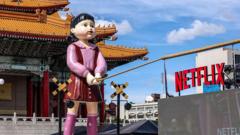On Sunday, Bolivia conducted its first-round presidential election, revealing surprising results where Senator Rodrigo Paz Pereira leads, alongside former president Jorge Quiroga. Current socialist governance faces criticism as voters express a strong desire for change amid economic turmoil.
Bolivia on the Brink of Historic Presidential Shift: First Non-Left Wing Leader in Two Decades

Bolivia on the Brink of Historic Presidential Shift: First Non-Left Wing Leader in Two Decades
Bolivia prepares for a pivotal runoff election, marking a significant political shift as the first non-left wing president in two decades emerges as a frontrunner.
In a groundbreaking election, Bolivia is set to potentially elect its first non-left wing president after nearly two decades of leftist governance. The initial round of voting on Sunday showed Senator Rodrigo Paz Pereira from the Christian Democratic Party and former president Jorge Quiroga emerging as the leading candidates, prompting a much-anticipated runoff election scheduled for October as neither secured enough votes for an outright victory, according to preliminary results.
Paz Pereira gained considerable attention as a leading candidate, countering pre-election predictions that suggested businessman Samuel Doria Medina would capture the most support. Running a campaign centered around fiscal decentralization, his message, "capitalism for all, not just a few," emphasizes the need for redistributing funds from the central government to regions, enhancing corruption fighting measures, implementing accessible credit programs, and reducing import restrictions on non-locally produced goods.
Jorge Quiroga, who briefly served as interim president and was Vice President under military leader Hugo Banzer, may also bring about significant shifts in Bolivia's foreign relations, particularly in the realm of trade. Both candidates promote capitalist policies that could encourage foreign investments in Bolivia's abundant lithium reserves, critical for battery manufacturing in electric vehicles and renewable technology.
The potential political shift towards the right comes as Bolivia confronts severe economic challenges including exacerbating inflation, a lack of food, and fuel shortages, all aggravating public sentiment against the ruling socialist party, Movimiento al Socialismo (MAS). The current president, Luis Arce, has opted not to seek re-election amid plummeting popularity, with the MAS party facing increasing criticism and public backlash.
Public sentiment towards the MAS party was starkly visible during the elections, as candidates faced hostility from voters, with some reported incidents of physical confrontations, including stones being thrown at left-wing candidate Andrónico Rodríguez and protests directed against MAS’s Eduardo del Castillo during voting.
In a notable absence from the election, former president Evo Morales, who faced legal restrictions against re-running, has urged his loyalists to nullify their votes. Morales, previously the dominant figure in Bolivian politics from 2006 to 2019, continues to wield influence, while internal divisions within the MAS party have intensified as the political landscape in Bolivia undergoes significant changes.
The backdrop of this election is a turbulent political history marked by past accusations of electoral fraud, protests, and significant power struggles within MAS which have escalated to protests and violence. With the country at a crossroads, the forthcoming runoff could lead to significant transformations in Bolivia's governance and its international relations, especially regarding its orientation towards foreign investment and diplomatic ties.
Paz Pereira gained considerable attention as a leading candidate, countering pre-election predictions that suggested businessman Samuel Doria Medina would capture the most support. Running a campaign centered around fiscal decentralization, his message, "capitalism for all, not just a few," emphasizes the need for redistributing funds from the central government to regions, enhancing corruption fighting measures, implementing accessible credit programs, and reducing import restrictions on non-locally produced goods.
Jorge Quiroga, who briefly served as interim president and was Vice President under military leader Hugo Banzer, may also bring about significant shifts in Bolivia's foreign relations, particularly in the realm of trade. Both candidates promote capitalist policies that could encourage foreign investments in Bolivia's abundant lithium reserves, critical for battery manufacturing in electric vehicles and renewable technology.
The potential political shift towards the right comes as Bolivia confronts severe economic challenges including exacerbating inflation, a lack of food, and fuel shortages, all aggravating public sentiment against the ruling socialist party, Movimiento al Socialismo (MAS). The current president, Luis Arce, has opted not to seek re-election amid plummeting popularity, with the MAS party facing increasing criticism and public backlash.
Public sentiment towards the MAS party was starkly visible during the elections, as candidates faced hostility from voters, with some reported incidents of physical confrontations, including stones being thrown at left-wing candidate Andrónico Rodríguez and protests directed against MAS’s Eduardo del Castillo during voting.
In a notable absence from the election, former president Evo Morales, who faced legal restrictions against re-running, has urged his loyalists to nullify their votes. Morales, previously the dominant figure in Bolivian politics from 2006 to 2019, continues to wield influence, while internal divisions within the MAS party have intensified as the political landscape in Bolivia undergoes significant changes.
The backdrop of this election is a turbulent political history marked by past accusations of electoral fraud, protests, and significant power struggles within MAS which have escalated to protests and violence. With the country at a crossroads, the forthcoming runoff could lead to significant transformations in Bolivia's governance and its international relations, especially regarding its orientation towards foreign investment and diplomatic ties.

















